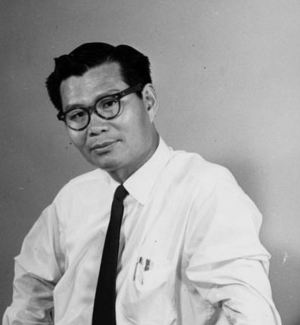Year born: 1919
Research Areas: Meteorite impacts
"People don't believe, but you do your hard work. It takes time to gradually convince them. You always have to find new, better evidence."
Source: Washington Post, Feb 2008

Early Life
Edward was born in Suzhou, China. His father was a philosopher and leading theologist in 20th century China. In 1945, Edward moved to the USA to teach Chinese to American troops. He got a PhD in Geology from the University of Chicago in 1948. In 1949, he moved to Virginia, USA and started working for the US Geological Survey.
Career Highlights
Edward preferred practical science over theory. He worked at the US Geological Survey for 45 years. He researched lots of topics including military geology and mining geology.
Edward is best known for his work on the geology of impact craters caused by meteorites. Edward discovered two new minerals that had not been found on the Earth’s surface before. He worked out that the minerals must have been created by the intense heat and pressure of a meteorite impact. This process is now known as ‘impact metamorphism’ and Edward was the first person to do research on that topic. Edward found the new minerals in craters in Germany and Ghana and confirmed they were made by meteorite impacts. His work shocked scientists in Germany. They thought a volcano made the crater.
Edward is also known for his work on tektites. Tektites are small pieces of melted Earth rock. Scientists did not know what made tektites until Edward found metal containing a mixture of iron and nickel inside a tektite. This proved they contained traces of meteorite and were made by impact metamorphism.
Edward was known for mentoring and encouraging other scientists. He also led one of the first scientific exchanges between the USA and Chinese governments in 1972 to promote diplomatic relations.
Legacy
Edward won the Wetherill Medal of the Franklin Institute in 1965 for discovering the two new minerals: coesite and stishovite. In 1992 the Meteoritical Society awarded him the Barringer Medal. The asteroid 3906 Chao is named after him. The mineral chaoite was also named in his honour.
Other Interests
Edward was interested in Buddhism, Chinese calligraphy, and music. He studied, memorised, and made a new English translation of Lao Tzu's "Tao Te Ching."
